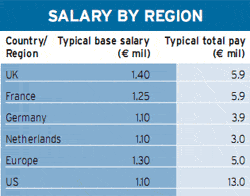UNITED STATES / EUROPE
 |
With corporate fat cats’ earnings increasingly in the spotlight, particularly in these credit-challenged times, it appears that CEO remuneration packages vary markedly depending on which side of the pond they are on. According to management consultancy Hay Group, CEOs in the United States are much better off receiving total salary and incentives packages, which are typically two-and-a-half times that of their European counterparts (€13 million versus €5 million). While US chief executives’ base salaries—around €1.1 million—are lower than their European counterparts’ €1.3 million average, their total remuneration is far higher.
Remuneration packages also differ markedly within Europe, with UK CEOs earning the highest base salaries—a median of €1.4 million—and German companies forking out the highest bonuses—almost two times salary. French companies, on the other hand, provided the largest incentives, typically 2.7 times salary, and the heftiest total direct compensation including salary, bonus, plus fair value of long-term incentive (LTI) award.
Explaining the differences between US and European CEO remuneration packages, Simon Garrett, director of executive reward at Hay Group, says that US tax and accounting rules encourage lower base salaries and discourage long-term incentives driven by hard-edged performance conditions. “As a result, US CEOs’ bonuses and LTIs grew and were often really about delivering more pay than motivating them to perform,” he comments. By contrast, he adds, shareholder activism in Europe—particularly the United Kingdom—has prompted many European companies to link tougher performance requirements to LTIs. “This sentiment seems to be spreading. US shareholders and regulators are now starting to demand more bangs for the LTI bucks,” Garrett says.
Anita Hawser



